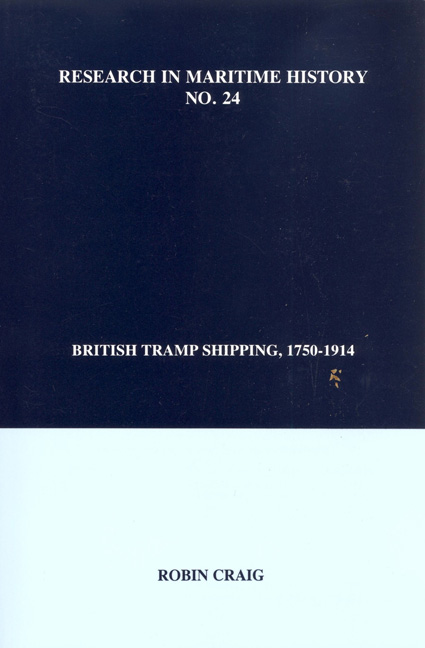Book contents
- Frontmatter
- Contents
- Introduction
- Tramp Shipping and Ownership
- The Trades
- The Seamen
- Tramp-Shipping Regions
- A. Wales
- B. The Northwest
- C. The West Country
- “Sources for a History of Devon Merchant Shipping, 1750-1920”
- D. The Northeast
- E. The Southeast
- F. The British Empire: Maritime Canada
- Bibliography
“Sources for a History of Devon Merchant Shipping, 1750-1920”
from C. The West Country
- Frontmatter
- Contents
- Introduction
- Tramp Shipping and Ownership
- The Trades
- The Seamen
- Tramp-Shipping Regions
- A. Wales
- B. The Northwest
- C. The West Country
- “Sources for a History of Devon Merchant Shipping, 1750-1920”
- D. The Northeast
- E. The Southeast
- F. The British Empire: Maritime Canada
- Bibliography
Summary
Merchant Shipping Records, 1750-1920
Any study of Devon shipping from the late eighteenth century onwards must embrace a close scrutiny and analysis of the Statutory Registers of British Shipping. Here, the historian owes an incalculable debt to the late Grahame Farr, who has assiduously transcribed and analysed the registers of the North Devon ports. 1 had the privilege of exchanging data with Mr. Farr over a period of many years, and have attempted a reconstruction of the missing registers of Barnstaple from 1786 and 1814. I have also transcribed the first volume of Exeter registers. Of greater importance is the scheme sponsored by the National Maritime Museum (now sadly in abeyance) in which it was intended that all available registers at each port should be transcribed on special machine-readable forms that would render the data amenable to computer analysis. A pilot project has been undertaken at the Gwynedd Archive Office in respect of vessels registered in the port of Beaumaris. One intractable problem has arisen in this analysis and in the similar scheme initiated for Atlantic Canadian shipping at Memorial University, Newfoundland. Whilst it is relatively simple (although time-consuming) to record ownership at the time a vessel is statutorily registered, it is a mistake to omit records of the subsequent transactions in shares in the individual ships. The registry archive is dynamic, not static, and; vessels were constantly changing hands, so that ideally, analysis should embrace the data that arise over the time of the ship's life. It will surely strike the transcriber of these records that there were surges in sales, purchases and mortgages which reflected changes in the circumstances of owners and mirrored fluctuations in the regional and national economy. Analysis which fails to locate these changes over time fails to make sense of the archive, and yet this time element is singularly resistant to computer analysis because of its quantitative proliferation. One other intractable problem requires consideration: owners became careless, especially in the latter half of the nineteenth century, in transferring to the owner's home port the registry of vessels they had acquired. As a consequence, registers at ports outside Devon will yield Devon-owned vessels.
- Type
- Chapter
- Information
- British Tramp Shipping, 1750–1914 , pp. 327 - 344Publisher: Liverpool University PressPrint publication year: 2003

